人为灾害英语讲稿
英文灾难演讲稿范文

Today, I stand before you to address a grave issue that has recently affected our nation. It is with a heavy heart and a sense of urgencythat I bring to your attention the catastrophic disaster that has unfolded in our beloved country.The disaster, which struck without warning, has caused immense loss of life, property, and infrastructure. The scale of destruction is unprecedented, and it has left us in a state of shock and despair. It is a reminder of the fragility of life and the power of nature.First and foremost, I would like to extend my deepest condolences to the families who have lost loved ones in this tragedy. The pain you are experiencing is unimaginable, and we stand with you in solidarity during these difficult times. Our hearts go out to you, and we promise to support you in every way possible.The disaster has left a trail of destruction that stretches across our lands. Entire towns have been reduced to ruins, homes have been lost, and communities have been uprooted. The economic impact is colossal, and it will take years, if not decades, to rebuild what has been lost.In the face of such devastation, it is important to recognize the bravery and resilience of our people. First responders, volunteers, and ordinary citizens have shown immense courage in the aftermath of the disaster. They have risked their own lives to save others, and their actions have been a testament to the human spirit.However, we must also acknowledge the shortcomings in our preparedness and response mechanisms. It is clear that more needs to be done to ensure that our nation is better equipped to handle such emergencies. This includes investing in infrastructure, improving early warning systems, and strengthening our emergency response capabilities.As we move forward, it is crucial that we prioritize the well-being of our citizens. We must ensure that those affected by the disaster receive the necessary aid and support to rebuild their lives. This includes providing temporary housing, food, clean water, and medical assistance.Additionally, we need to address the long-term needs of affected communities, such as job creation, education, and mental health support.Furthermore, we must learn from this disaster and take steps to prevent future occurrences. This requires a collaborative effort from government, private sector, and civil society. We need to invest in research and development to better understand and predict natural disasters. We also need to implement stricter regulations and policies to mitigate the impact of human activities on our environment.Ladies and gentlemen, the road to recovery will be long and challenging. However, it is through unity, determination, and unwavering spirit that we will overcome this adversity. Let us not forget the lessons learned from this disaster and let them guide us in building a stronger, more resilient nation.In conclusion, I urge each and every one of you to stand together in solidarity and support those affected by this catastrophic disaster. Let us work together to rebuild our communities, restore hope, and create a brighter future for our children and generations to come.Thank you.。
英文发言稿灾难
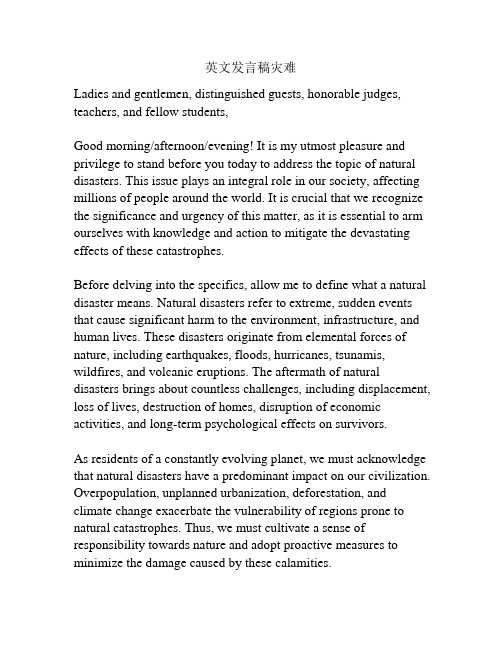
英文发言稿灾难Ladies and gentlemen, distinguished guests, honorable judges, teachers, and fellow students,Good morning/afternoon/evening! It is my utmost pleasure and privilege to stand before you today to address the topic of natural disasters. This issue plays an integral role in our society, affecting millions of people around the world. It is crucial that we recognize the significance and urgency of this matter, as it is essential to arm ourselves with knowledge and action to mitigate the devastating effects of these catastrophes.Before delving into the specifics, allow me to define what a natural disaster means. Natural disasters refer to extreme, sudden events that cause significant harm to the environment, infrastructure, and human lives. These disasters originate from elemental forces of nature, including earthquakes, floods, hurricanes, tsunamis, wildfires, and volcanic eruptions. The aftermath of natural disasters brings about countless challenges, including displacement, loss of lives, destruction of homes, disruption of economic activities, and long-term psychological effects on survivors.As residents of a constantly evolving planet, we must acknowledge that natural disasters have a predominant impact on our civilization. Overpopulation, unplanned urbanization, deforestation, and climate change exacerbate the vulnerability of regions prone to natural catastrophes. Thus, we must cultivate a sense of responsibility towards nature and adopt proactive measures to minimize the damage caused by these calamities.The first step in mitigating the effects of natural disasters lies in understanding and preparing for them. Education and awareness play a vital role in equipping communities with the necessary knowledge and skills to respond effectively. Governments, in collaboration with non-governmental organizations and educational institutions, should prioritize disaster preparedness programs. These programs should focus on educating citizens about early warning systems, evacuation routes, emergency shelters, and first aid techniques. By instilling a culture of preparedness, we can ensure that communities are equipped to face the challenges posed by natural disasters.In addition to education, investing in advanced technology and infrastructure is essential in disaster response and recovery efforts. Governments must allocate adequate resources to develop and maintain early warning systems, satellite monitoring, and improved infrastructure that can withstand the impact of natural disasters. For example, constructing earthquake-resistant buildings in seismic zones, reinforcing flood defenses, and creating firebreaks in wildfire-prone regions are crucial steps towards minimizing the effects of disasters.Furthermore, collaboration and international cooperation are key aspects of disaster management. In today's interconnected world, no country can confront natural disasters alone. Governments should establish networks and share information, resources, and expertise to respond effectively to natural disasters. Regional cooperation can also be instrumental in providing aid to countries that lack the necessary resources and expertise to manage disasters on their own.Nonetheless, the aftermath of natural disasters exposes the fragile nature of societal structures, emphasizing the need for humanitarian assistance. Extending support and relief to affected communities demonstrates compassion and solidarity. Here, civil society organizations, community groups, and individuals can play a significant role in providing immediate and long-term assistance, including food, shelter, medical aid, and psychological support. The power of a helping hand should never be underestimated, as it can rebuild lives and restore hope for a brighter future.Lastly, the significance of long-term planning and prevention cannot be overstated. Governments and stakeholders must prioritize sustainable development policies that address the root causes of natural disasters. Implementing measures to reduce greenhouse gas emissions, protecting natural habitats, enforcing building codes, and promoting climate change adaptation strategies are integral steps towards building a resilient society that can withstand the impacts of inevitable natural disasters.In conclusion, natural disasters are inevitable events that have the potential to wreak havoc on human lives, infrastructure, and the environment. By educating ourselves, preparing communities, investing in technology and infrastructure, fostering international cooperation, extending humanitarian assistance, and practicing long-term planning and prevention, we can minimize the devastating effects of natural disasters. Let us remember that our actions today will directly impact the lives of future generations, and it is our duty to leave behind a world that is better equipped and prepared to face the challenges posed by these calamities.Thank you for your attention.。
人为灾害作文英文初中
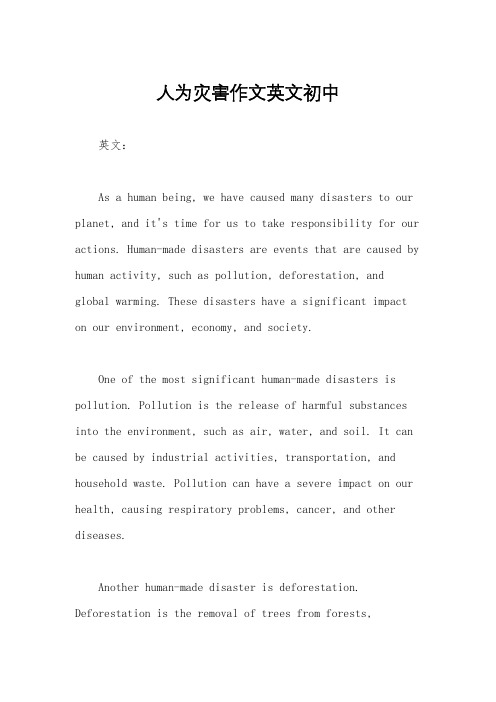
人为灾害作文英文初中英文:As a human being, we have caused many disasters to our planet, and it's time for us to take responsibility for our actions. Human-made disasters are events that are caused by human activity, such as pollution, deforestation, and global warming. These disasters have a significant impact on our environment, economy, and society.One of the most significant human-made disasters is pollution. Pollution is the release of harmful substances into the environment, such as air, water, and soil. It can be caused by industrial activities, transportation, and household waste. Pollution can have a severe impact on our health, causing respiratory problems, cancer, and other diseases.Another human-made disaster is deforestation. Deforestation is the removal of trees from forests,primarily for commercial purposes. It can lead to soil erosion, loss of biodiversity, and climate change. Deforestation has a significant impact on our environment, as it affects the water cycle, soil quality, and air quality.Global warming is also a human-made disaster that is caused by the emission of greenhouse gases, such as carbon dioxide, into the atmosphere. These gases trap heat, causing the Earth's temperature to rise. Global warming can lead to severe weather conditions, such as hurricanes, floods, and droughts, which can have a significant impact on our economy and society.As a society, we need to take responsibility for our actions and work towards reducing human-made disasters. We can do this by reducing our carbon footprint, recycling, using public transportation, and supporting sustainable practices. It's time for us to take action and protect our planet for future generations.中文:作为人类,我们对我们的星球造成了许多灾难,现在是我们承担责任的时候了。
人为灾害英语讲稿
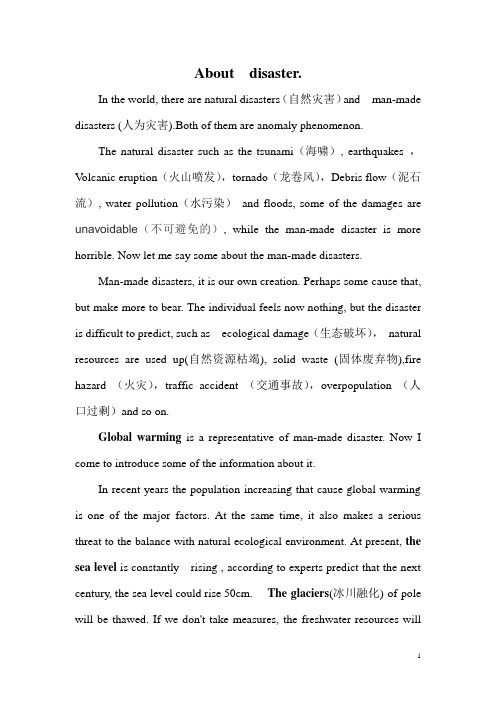
About disaster.In the world, there are natural disasters(自然灾害)and man-made disasters (人为灾害).Both of them are anomaly phenomenon.The natural disaster such as the tsunami(海啸), earthquakes ,V olcanic eruption(火山喷发),tornado(龙卷风),Debris flow(泥石流), water pollution(水污染)and floods, some of the damages are unavoidable(不可避免的), while the man-made disaster is more horrible. Now let me say some about the man-made disasters.Man-made disasters, it is our own creation. Perhaps some cause that, but make more to bear. The individual feels now nothing, but the disaster is difficult to predict, such as ecological damage(生态破坏),natural resources are used up(自然资源枯竭), solid waste (固体废弃物),fire hazard (火灾),traffic accident (交通事故),overpopulation (人口过剩)and so on.Global warming is a representative of man-made disaster. Now I come to introduce some of the information about it.In recent years the population increasing that cause global warming is one of the major factors. At the same time, it also makes a serious threat to the balance with natural ecological environment. At present, the sea level is constantly rising , according to experts predict that the next century, the sea level could rise 50cm. The glaciers(冰川融化)of pole will be thawed. If we don't take measures, the freshwater resources willdirectly cause the destruction and pollution. The fundamental method is to reduce carbon emissions, such as reducing population(减少人口), reducing fossil fuels( coal, oil and gas, etc.减少化石燃料), using more new energy (light and water, wind,使用新能源etc), more creature planting green plants绿色植物to absorb carbon and give off oxygen to improve the condition.Since they are man-made disasters, I think we should solve that from the start. The earth is our only home-planet. It is urgent for us to stop damaging it, and to do our best to protect it and make it a lovely place suitable to live in.Let us make a little contribution to the society,and making our motherland more beautiful.。
灾害防范英语演讲稿范文
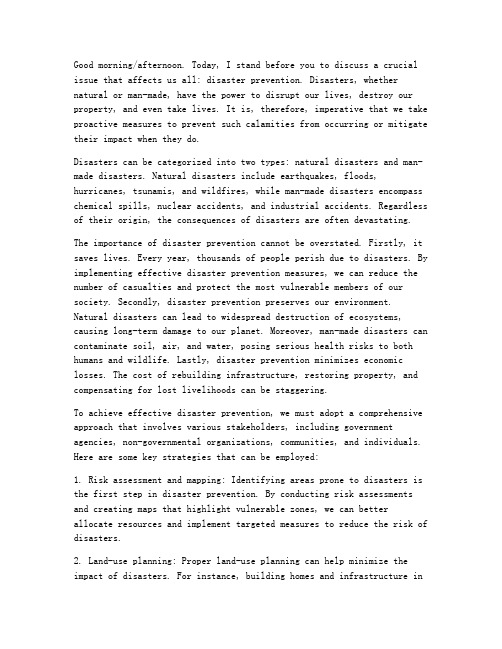
Good morning/afternoon. Today, I stand before you to discuss a crucial issue that affects us all: disaster prevention. Disasters, whether natural or man-made, have the power to disrupt our lives, destroy our property, and even take lives. It is, therefore, imperative that we take proactive measures to prevent such calamities from occurring or mitigate their impact when they do.Disasters can be categorized into two types: natural disasters and man-made disasters. Natural disasters include earthquakes, floods, hurricanes, tsunamis, and wildfires, while man-made disasters encompass chemical spills, nuclear accidents, and industrial accidents. Regardless of their origin, the consequences of disasters are often devastating.The importance of disaster prevention cannot be overstated. Firstly, it saves lives. Every year, thousands of people perish due to disasters. By implementing effective disaster prevention measures, we can reduce the number of casualties and protect the most vulnerable members of our society. Secondly, disaster prevention preserves our environment. Natural disasters can lead to widespread destruction of ecosystems, causing long-term damage to our planet. Moreover, man-made disasters can contaminate soil, air, and water, posing serious health risks to both humans and wildlife. Lastly, disaster prevention minimizes economic losses. The cost of rebuilding infrastructure, restoring property, and compensating for lost livelihoods can be staggering.To achieve effective disaster prevention, we must adopt a comprehensive approach that involves various stakeholders, including government agencies, non-governmental organizations, communities, and individuals. Here are some key strategies that can be employed:1. Risk assessment and mapping: Identifying areas prone to disasters is the first step in disaster prevention. By conducting risk assessments and creating maps that highlight vulnerable zones, we can betterallocate resources and implement targeted measures to reduce the risk of disasters.2. Land-use planning: Proper land-use planning can help minimize the impact of disasters. For instance, building homes and infrastructure inhigh-risk areas, such as floodplains or earthquake-prone zones, should be avoided. Additionally, creating green spaces and preserving natural buffers can act as barriers against natural disasters.3. Early warning systems: Developing and maintaining early warning systems is crucial for disaster prevention. These systems can provide timely alerts to the public, enabling them to take necessary precautions and evacuate if needed. Investing in technology, such as satellite imagery and seismological monitoring, can enhance the accuracy and reliability of early warning systems.4. Public awareness and education: Educating the public about the risks of disasters and the necessary precautions to take is essential. This includes disseminating information about emergency response procedures, first aid training, and the importance of having an emergency kit. Schools, community centers, and workplaces should all be involved in promoting disaster preparedness.5. Emergency response planning: Governments and organizations should develop comprehensive emergency response plans that outline the steps to be taken during a disaster. This includes coordinating with various agencies, such as fire departments, police, and medical services, to ensure an efficient and coordinated response.6. Infrastructure resilience: Investing in resilient infrastructure can reduce the impact of disasters. This includes constructing buildings and roads that can withstand extreme weather conditions, improving drainage systems to prevent flooding, and ensuring that critical infrastructure, such as hospitals and power plants, can continue to function during a disaster.7. International cooperation: Disasters do not recognize national boundaries. Therefore, international cooperation is vital in sharing knowledge, resources, and best practices in disaster prevention. This includes participating in regional and global initiatives aimed at reducing disaster risks and promoting disaster resilience.In conclusion, disaster prevention is a crucial responsibility that we must all undertake. By adopting a comprehensive approach, we can reduce the risk of disasters, protect lives and property, and safeguard our environment. Let us work together to create a safer and more resilient future for ourselves and future generations.Thank you.。
呼吁所有人注意人为自然灾害英语作文
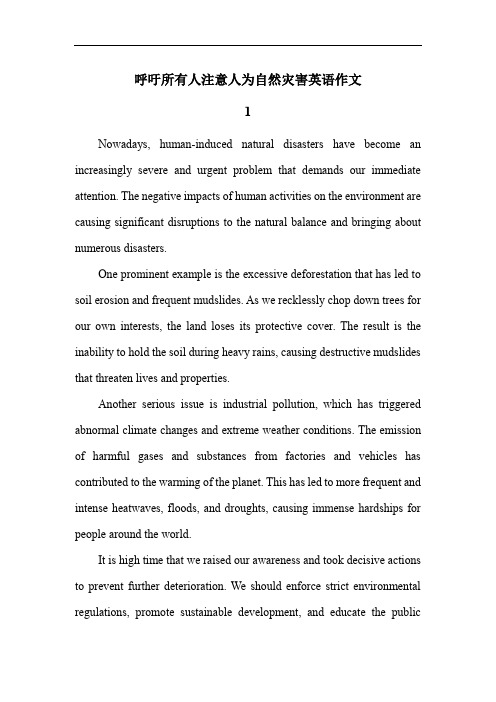
呼吁所有人注意人为自然灾害英语作文1Nowadays, human-induced natural disasters have become an increasingly severe and urgent problem that demands our immediate attention. The negative impacts of human activities on the environment are causing significant disruptions to the natural balance and bringing about numerous disasters.One prominent example is the excessive deforestation that has led to soil erosion and frequent mudslides. As we recklessly chop down trees for our own interests, the land loses its protective cover. The result is the inability to hold the soil during heavy rains, causing destructive mudslides that threaten lives and properties.Another serious issue is industrial pollution, which has triggered abnormal climate changes and extreme weather conditions. The emission of harmful gases and substances from factories and vehicles has contributed to the warming of the planet. This has led to more frequent and intense heatwaves, floods, and droughts, causing immense hardships for people around the world.It is high time that we raised our awareness and took decisive actions to prevent further deterioration. We should enforce strict environmental regulations, promote sustainable development, and educate the publicabout the importance of protecting our environment. Only by working together can we mitigate the severity of human-induced natural disasters and ensure a sustainable future for generations to come. Let us act now before it is too late.2Human activities have increasingly led to various natural disasters, and it is high time that we all paid close attention to this issue. The causes and harms of man-made natural disasters are deeply rooted and wide-ranging.Take the rapid urbanization process as an example. Unreasonable planning often results in flood disasters. Cities expand rapidly without proper consideration of drainage systems, and when heavy rains come, water accumulates, causing significant damage to property and threatening people's lives.Another prominent issue is the random disposal of waste. The unrestrained discharge of industrial and domestic waste disrupts the ecological balance. This disruption leads to a series of problems such as soil erosion, water pollution, and the outbreak of diseases. For instance, excessive chemical waste in water bodies can kill aquatic life and ultimately affect the entire ecosystem.These man-made natural disasters not only cause immediate losses but also have long-term negative impacts. They undermine the stability andsustainability of our living environment, making our future full of uncertainties.Therefore, it is the responsibility of each of us to take action. We should raise awareness, promote scientific planning in urban development, and implement strict waste management regulations. Only by doing so can we minimize the occurrence of man-made natural disasters and ensure a better future for ourselves and future generations.3Nowadays, human-induced natural disasters have become an increasingly serious problem that demands our urgent attention. It is astonishing to note that each year, these disasters caused by human activities result in colossal economic losses and a heartbreaking number of casualties.For instance, deforestation leads to soil erosion and frequent floods, which not only destroy countless homes but also disrupt people's lives and cause significant economic setbacks. The excessive emission of greenhouse gases contributes to global warming, triggering more extreme weather conditions like heatwaves and droughts. These disasters inflict immense damage on agriculture and infrastructure, with the economic losses running into billions of dollars.However, there are also positive examples where effective measures have been taken to mitigate the occurrence of such disasters. In someregions, strict environmental regulations and reforestation efforts have successfully reduced the frequency and severity of floods. The implementation of sustainable energy policies has curbed the emission of harmful gases, improving the climate and minimizing the risks of related disasters.We must all recognize that the power to prevent these disasters lies in our hands. It is our responsibility to take action and make a change. We should adopt eco-friendly lifestyles, support green technologies, and advocate for stronger environmental protection laws. Only through our collective efforts can we hope to build a safer and more sustainable world for future generations. Let us act now before it is too late.4In today's world, man-made natural disasters have become a serious global issue that demands our immediate attention and collective efforts. These disasters are not only causing immense damage to our environment but also threatening the very existence of humanity.Take the example of transboundary pollution. Industries in one country may release harmful substances that spread across borders, affecting the air, water, and soil of neighboring nations. This leads to a chain reaction of ecological imbalance and poses risks to the health and livelihoods of people in multiple regions.Another significant concern is climate change. It is a global challengethat requires joint actions from all countries. The excessive emission of greenhouse gases has led to rising temperatures, melting glaciers, and more frequent extreme weather events such as floods, droughts, and heatwaves. These disasters do not respect national boundaries and have a far-reaching impact on the entire planet.It is evident that man-made natural disasters are not isolated incidents but rather interconnected problems that require international cooperation. We need to share knowledge and technology, establish common policies and regulations, and work together to reduce pollution and mitigate the effects of climate change.Only through global unity and determined efforts can we hope to effectively address these pressing issues and safeguard our planet for future generations. Let us come together and take decisive action now, before it is too late.5In recent years, the issue of man-made natural disasters has become increasingly prominent and demands our immediate attention. Scientific research has revealed alarming connections between human activities and the escalating frequency and severity of natural calamities.Recent studies have shown that deforestation, for instance, not only disrupts the ecological balance but also contributes significantly to soil erosion and increased flood risks. Moreover, the excessive emission ofgreenhouse gases due to industrial activities has led to global warming, resulting in more extreme weather conditions such as heatwaves, droughts, and powerful storms.Expert predictions for the future are equally disturbing. They anticipate that if we continue on this unsustainable path, the frequency and intensity of man-made disasters will multiply exponentially. This could potentially lead to widespread food shortages, mass migrations, and even threaten the very existence of some communities.It is high time that we recognized the gravity of the situation and took collective and decisive action. We must enforce strict environmental regulations, promote sustainable energy sources, and raise public awareness about the importance of environmental conservation. Only through our concerted efforts can we hope to mitigate the threat of man-made natural disasters and secure a sustainable future for generations to come. Let us act now before it is too late.。
人为灾害作文英文
人为灾害作文英文英文:As a human being, we have caused numerous disasters to our planet. These disasters can be categorized into natural disasters and man-made disasters. Today, I am going to talk about man-made disasters.Man-made disasters are caused by human activities, such as pollution, deforestation, and nuclear accidents. These activities have a negative impact on the environment and can cause harm to human health. For example, pollution from factories and vehicles can lead to respiratory problems and even cancer. Deforestation can cause soil erosion and lead to floods and landslides. Nuclear accidents can cause radiation poisoning and have long-term effects on the environment.One of the biggest man-made disasters in recent history is the Chernobyl nuclear disaster in 1986. The explosion atthe nuclear power plant caused a massive release of radioactive material into the environment. The disaster had a devastating impact on the health of the local population and the environment. Even today, over 30 years later, the area around the Chernobyl power plant is still uninhabitable.Another example of man-made disasters is the Great Pacific Garbage Patch. This is a massive collection of plastic waste in the Pacific Ocean, caused by humanactivities such as littering and improper disposal ofplastic products. The garbage patch is estimated to betwice the size of Texas and is having a negative impact on marine life and the environment.In conclusion, man-made disasters are a serious threatto our planet and our health. We need to takeresponsibility for our actions and make changes to reduce our impact on the environment. This can include reducingour use of plastic products, using renewable energy sources, and implementing stricter regulations on pollution.中文:作为人类,我们已经给我们的星球带来了无数的灾难。
洪灾报道英语演讲稿范文
Good morning/afternoon/evening. I stand before you today to address a solemn and urgent matter that has recently impacted our community—our struggle against the devastating floods that have swept through our region.As we gather here, our hearts are heavy with the loss and the hardship that so many of our fellow citizens have endured. The floodwaters that have ravaged our lands, homes, and livelihoods are a stark reminder of the fragility of our world and the power of nature. It is in these moments of adversity that we must come together, support one another,and rebuild our lives with resilience and hope.Let us begin by acknowledging the scale of the disaster. The recent floods have caused widespread damage across our state, affecting thousands of families and businesses. The waters have risen, submerging entire neighborhoods, destroying homes, and displacing countless individuals. Our infrastructure, including roads, bridges, and utilities, has been compromised, leaving us with a daunting task of recovery and reconstruction.The human toll of this catastrophe is immeasurable. We have lost loved ones, witnessed the despair of those who have lost everything, and felt the collective grief that binds us all. Our schools, hospitals, and emergency services have worked tirelessly to provide relief and assistance, often facing their own challenges in the face of the disaster.As we reflect on the floods, it is crucial to understand the factorsthat contributed to this disaster. Climate change is a significant factor, with scientists warning that extreme weather events like these are likely to become more frequent and severe. The changing patterns of precipitation, combined with deforestation and urbanization, have led to an increased risk of flooding in our region.However, it is not solely nature's wrath that has brought us to this moment. Human negligence and inadequate infrastructure planning havealso played a role. As we rebuild, we must learn from these mistakes and commit to a more sustainable and resilient future.In the aftermath of the floods, our first priority must be to provide immediate relief to those in need. This includes ensuring that families have access to food, shelter, and medical care. The government, non-governmental organizations, and private sector must work together to coordinate efforts and deliver aid efficiently.The long-term recovery process will require a comprehensive approach. We must prioritize the reconstruction of critical infrastructure, including homes, schools, and healthcare facilities. It is essential to invest in flood defenses, such as levees and stormwater management systems, to protect our communities from future disasters.Furthermore, we must focus on strengthening our community resilience. This involves raising awareness about flood risks, implementing early warning systems, and training our citizens in emergency preparedness. By empowering our people to take proactive measures, we can minimize the impact of future floods.In our efforts to rebuild, we must also address the socio-economic implications of the disaster. The floods have not only destroyed physical assets but have also disrupted the livelihoods of many. We must provide support to businesses, farmers, and workers affected by the disaster, ensuring that they have the resources to recover and thrive.Ladies and gentlemen, the road to recovery will be long and challenging. However, it is a journey that we must undertake together, hand in hand. Our unity and solidarity will be our greatest strength in overcomingthis adversity.As we rebuild, let us remember the lessons learned from this disaster. Let us invest in sustainable practices that protect our environment and reduce the risk of future floods. Let us foster a culture of preparedness and resilience, ensuring that our communities are better equipped to face the challenges of the future.In conclusion, the recent floods have brought immense pain and suffering to our region. However, they have also awakened a collective spirit of determination and hope. With our unwavering commitment to rebuild, wecan transform this tragedy into an opportunity for a stronger, more resilient, and sustainable future.Thank you for your attention and support. Together, we shall rise above the floods and emerge as a more united and resilient community.God bless our efforts, and God bless our beloved country.Thank you.。
以灾难为话题的英语演讲稿
以灾难为话题的英语演讲稿Disaster is a topic that has always been of great concern to people around the world. Whether it is a natural disaster such as an earthquake, flood, or hurricane, or a man-made disaster such as a terrorist attack or industrial accident, the impact on people's lives can be devastating. Today, I would like to talk about the topic of disaster and how we can respond to it.First and foremost, it is important to understand that disasters can strike at any time, and it is crucial for us to be prepared. This means having a plan in place for how to respond in the event of a disaster, as well as having the necessary supplies and resources on hand. It also means being aware of the potential risks in our area and taking steps to mitigate them. By being prepared, we can minimize the impact of a disaster and ensure the safety of ourselves and our loved ones.In addition to being prepared, it is also important for us to come together as a community in the face of a disaster. This means supporting one another, offering assistance to those in need, and working together to rebuild and recover. In times of crisis, it is often the strength and resilience of the community that helps to see us through.Furthermore, it is essential for us to learn from past disasters and take steps to prevent similar events from occurring in the future. This may involve improving infrastructure, implementing better safety measures, and investing in early warning systems. By learning from the mistakes of the past, we can work towards a safer and more secure future.Finally, it is important for us to show compassion and empathy towards those who have been affected by a disaster. This means offering support and assistance to those in need, and doing our part to alleviate their suffering. By coming together as a global community, we can make a real difference in the lives of those affected by disaster.In conclusion, the topic of disaster is a sobering one, but it is also one that offers us the opportunity to come together, support one another, and work towards a better future.By being prepared, coming together as a community, learning from the past, and showing compassion, we can respond to disasters in a way that helps to minimize their impact and build a stronger, more resilient world. Thank you.。
呼吁所有人注意人为自然灾害书信英语作文
呼吁所有人注意人为自然灾害书信英语作文Dear all,I am writing to call for everyone's attention to the issue of man-made natural disasters. As we all know, natural disasters such as floods, hurricanes, and earthquakes can cause great damage and loss of life. However, many of these disasters are exacerbated or even caused by human activities.For example, deforestation and land development can lead to soil erosion, which in turn can cause landslides and mudslides. Pollution and climate change can also contribute to the severity of natural disasters. It is therefore crucial that we take responsibility for our actions and work to prevent man-made disasters.One way to do this is to reduce our carbon footprint and adopt sustainable practices in our daily lives. We can also support policies and initiatives that aim to protect the environment and mitigate the effects of climate change. Additionally, we should be mindful of the consequences ofour actions and avoid activities that may harm the environment or put ourselves and others at risk.In conclusion, it is time for us to recognize the impact of human activities on the natural world and take action to prevent man-made disasters. Let us work together to createa safer and more sustainable future for ourselves and for generations to come.中文翻译:亲爱的大家,我写信呼吁所有人注意人为自然灾害的问题。
- 1、下载文档前请自行甄别文档内容的完整性,平台不提供额外的编辑、内容补充、找答案等附加服务。
- 2、"仅部分预览"的文档,不可在线预览部分如存在完整性等问题,可反馈申请退款(可完整预览的文档不适用该条件!)。
- 3、如文档侵犯您的权益,请联系客服反馈,我们会尽快为您处理(人工客服工作时间:9:00-18:30)。
Today my topic is man-made disaster.
In the world, there are natural disasters, ecological disaster, man-made disasters.
In the natural disaster such as the tsunami, earthquakes and floods, some of the damages are unavoidable, while the man-made disaster is more horrible. Now let me say some about the man-made disasters.
Man-made disasters, it is our own creation. Perhaps some cause that, but make more to bear. The individual feels now nothing, but the disaster is difficult to predict, such as food safety accidents, terrorist attack and so on.
Global warming is a representative of man-made disaster. Now I come to introduce some of the information about it.
In recent years the population increasing that cause global warming is one of the major factors. At the same time, it also makes a serious threat to the balance with natural ecological environment. So many people, only their emissions of co2 will be a surprising number, with factory and car sending out, and their result will be directly causing system of carbon dioxide in the atmosphere, thus formed constantly increased carbon dioxide "greenhouse effect" on the surface of the earth will directly affect the climate change.
At present, the sea is constantly a rising trend, according to experts predict that the next century, the sea level could rise 50cm. If you don't take measures, and freshwater resources will directly cause the destruction and pollution, etc.
Global warming is now no one doubts that global warming is caused by the people. Even if global warming can control a few, but the impact of the disaster is certainly nothing before. Over the years, the disaster was very slow, so that people have noticed it. But now, everyone can see: global ice is melting, sea-level rise, the southwestern United States, Australia, and sub-saharan African drought. Although these disasters incompletely caused by global warming, still to some degree, and they also will be increasing with global warming, eventually, that is endangering the survival of mankind.
The fundamental method is to reduce carbon emissions, such as reducing
population, reducing fossil fuels( coal, oil and gas, etc.), using more new energy (light and water, wind, etc), more creature planting green plants to absorb carbon and give off oxygen to improve the condition, etc. _ et cetera
Since is a man-made disasters, I think we should solve that from the start. Let us make a little contribution to the society, making our motherland more beautiful.
这个世界上,有自然灾害、生态灾难,天灾人祸。
在自然灾害如洪水、地震和海啸损失的,有些是不可避免的,而在天灾人祸更可怕。
现在让我说些关于天灾人祸。
天灾人祸,它是我们自己创造的。
也许一些原因,但让更多的熊。
个人觉得现在没什么,但这场灾难难以预测,如食品安全事故、恐怖袭击之类的东西。
全球变暖是最具代表性的天灾人祸。
现在我来介绍一些关于它的信息。
近年来的人口增长是造成全球变暖的一个重要因素。
同时,这也使得一个严重的威胁,与自然生态环境的平衡。
如此多的人,只有他们的排放的二氧化碳会被一个惊人的数字,工厂和汽车送出去,其结果将直接导致系统的二氧化碳在大气中,从而形成了不断增加的二氧化碳“温室效应”在地球的表面,将直接影响气候的变化。
目前,海是不断上升趋势,根据专家预言,到下个世纪,海平面上升50厘米。
如果你不采取措施,将直接导致了淡水资源的破坏和污染等。
全球变暖是现在没有人怀疑全球变暖的原因是由于人们。
即使能控制全球变暖的影响,但肯定是什么灾难。
在过去的几年里,这场灾难很缓慢,所以,人们都注意到了这一点。
但是现在,每个人都可以看到:全球冰融化,海平面上升,美国,澳大利亚和撒哈拉以南的非洲的干旱。
虽然这些灾害造成的全球变暖,论者仍然在某种程度上,他们也会增加与全球变暖,最终危及人类的生存。
基本方法是减少碳排放,例如减少人口减少化石燃料(煤、石油和天然气,等等),使用更多的新能源(光和水,风,等等),更多的生物种植绿色植物吸收二氧化碳放出氧气,改善状况,等。
_双键中
既然是天灾人祸,我认为我们应该解决的起点。
让我们做一个小对社会有所贡献,使我们的祖国更美丽。
